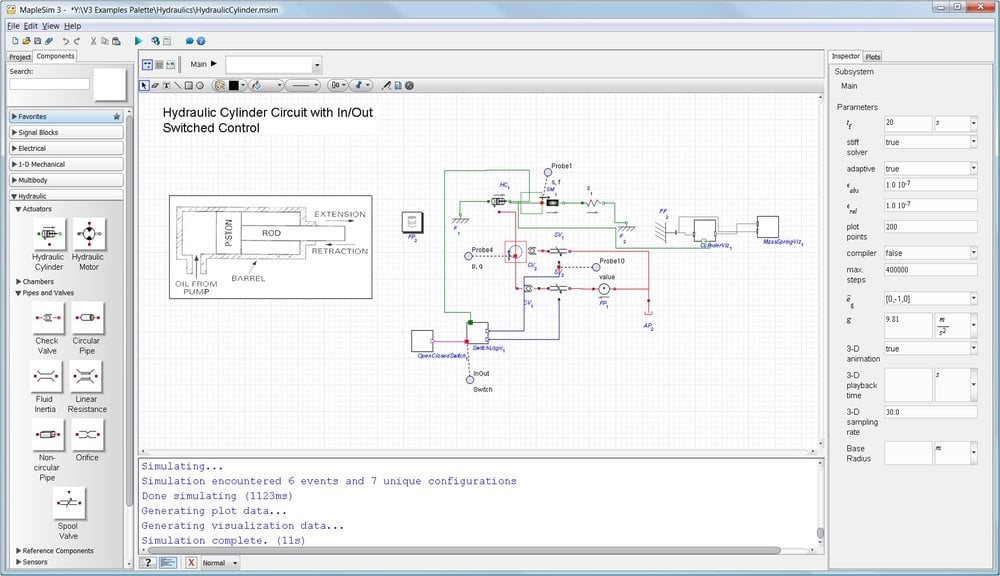www.industrymiddleeast.com
27
'09
Written on Modified on
Maplesoft’s new solution suite
Maplesoft™, announced several new products that will help educators, researchers, and students better understand and manage the complexity of engineering modeling and simulation problems : MapleSim 3, MapleSim Control Design Toolbox, and MapleSim LabVIEW Connector

MapleSim 3 – MapleSim, Maplesoft’s core physical modeling product, has a rich modeling platform which has been greatly enhanced in this release. Modeling capabilities have been extended with new component libraries for hydraulics and electrical machines. New refined solvers that handle even greater model complexity have also been added. An extensive collection of prebuilt models greatly accelerates the introduction of MapleSim in any academic setting. In the classroom, MapleSim provides an environment where instructors can quickly demonstrate the connection between concepts and their underlying mathematical theory and physical behavior. For research applications, MapleSim produces highly optimized equation-based models to provide the best possible real-time performance for hardware-in-the-loop (HIL) applications.
MapleSim Control Design Toolbox – The MapleSim Control Design Toolbox provides a solid set of essential control design tools that extend MapleSim’s exceptional plant modeling capabilities to support control design. This toolbox takes advantage of the symbolic approach for designing, analyzing, and testing control systems, which results in greater flexibility and accuracy. In addition, developing plants and controllers together in the MapleSim environment accelerates the development process. With this toolbox, MapleSim can be used to teach the fundamentals of control design in a way that provides deeper insight and understanding.
MapleSim LabVIEW Connector – This toolbox integrates MapleSim's rich modeling environment into the popular LabVIEW® real-time platform from National Instruments (NI). Engineers using LabVIEW can quickly develop and optimize complex engineering system models in the intuitive visual modeling environment of MapleSim. This new toolbox joins the MapleSim Simulink® Connector (formerly known as the MapleSim Connectivity Toolbox), which provides enhanced connectivity with Simulink and Real-Time Workshop®. When combined, these products ensure that MapleSim now connects to all popular real-time platforms typically found in university labs.
“Physical modeling is certainly driving the designs of tomorrow,” said Jim Cooper, President and CEO, Maplesoft. “These new products will provide researchers and students with critical tools necessary to understand and tackle complex modern engineering challenges. They will empower the academic engineering community to engage in cutting edge research and prepare students for the challenges ahead.”
Dr. Stephen Lynch, Professor at Manchester Metropolitan University, UK and a leader in the use of mathematical software in teaching and learning, features MapleSim in the second edition of his best-selling book, Dynamical Systems and Applications using Maple. The book introduces readers to the theory of dynamical systems through theoretical and practical examples. Discussing his experience with MapleSim, Dr. Lynch explains, “MapleSim is fantastic. With the support of powerful tools like MapleSim, there’s no limit to how far students can reach.”
As part of its improved engineering solution offering, Maplesoft also announced a significant expansion of its Application Engineering Division. This group has been expanded to assist customers with modeling issues in a timely manner and to rapidly deploy MapleSim in academic and research organizations. This group is global in scope, integrating services from Maplesoft’s solution partners from around the world.
MapleSim Control Design Toolbox – The MapleSim Control Design Toolbox provides a solid set of essential control design tools that extend MapleSim’s exceptional plant modeling capabilities to support control design. This toolbox takes advantage of the symbolic approach for designing, analyzing, and testing control systems, which results in greater flexibility and accuracy. In addition, developing plants and controllers together in the MapleSim environment accelerates the development process. With this toolbox, MapleSim can be used to teach the fundamentals of control design in a way that provides deeper insight and understanding.
MapleSim LabVIEW Connector – This toolbox integrates MapleSim's rich modeling environment into the popular LabVIEW® real-time platform from National Instruments (NI). Engineers using LabVIEW can quickly develop and optimize complex engineering system models in the intuitive visual modeling environment of MapleSim. This new toolbox joins the MapleSim Simulink® Connector (formerly known as the MapleSim Connectivity Toolbox), which provides enhanced connectivity with Simulink and Real-Time Workshop®. When combined, these products ensure that MapleSim now connects to all popular real-time platforms typically found in university labs.
“Physical modeling is certainly driving the designs of tomorrow,” said Jim Cooper, President and CEO, Maplesoft. “These new products will provide researchers and students with critical tools necessary to understand and tackle complex modern engineering challenges. They will empower the academic engineering community to engage in cutting edge research and prepare students for the challenges ahead.”
Dr. Stephen Lynch, Professor at Manchester Metropolitan University, UK and a leader in the use of mathematical software in teaching and learning, features MapleSim in the second edition of his best-selling book, Dynamical Systems and Applications using Maple. The book introduces readers to the theory of dynamical systems through theoretical and practical examples. Discussing his experience with MapleSim, Dr. Lynch explains, “MapleSim is fantastic. With the support of powerful tools like MapleSim, there’s no limit to how far students can reach.”
As part of its improved engineering solution offering, Maplesoft also announced a significant expansion of its Application Engineering Division. This group has been expanded to assist customers with modeling issues in a timely manner and to rapidly deploy MapleSim in academic and research organizations. This group is global in scope, integrating services from Maplesoft’s solution partners from around the world.

